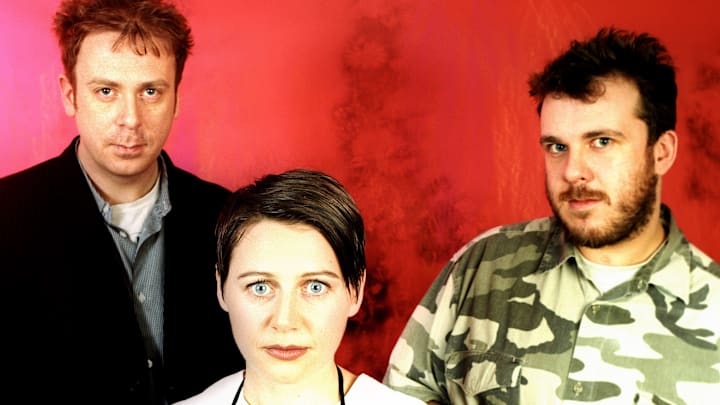Gibberish has a storied history in pop music. An impressive range of glossolalia (or the phenomenon of speaking in an unknown language) sprouted from the “oobie doobies” and “sha-la-las” of early doo-wop and rock n’ roll, crystalized in the 1950s by Little Richard’s seminal “Tutti Frutti.”
More recently, Iceland’s Sigur Ros created an entire album using glossolalia (employing a language they called Hopelandish) and prompted listeners to divine their own meaning from the rhythmic syllables. 90s boy bands sometimes dabbled in minor glossolalia, and even modern radio hits feature heavy use of “oohs” and “ahs” – a kind of “glossolalia-lite.”
One such album that relies heavily on glossolalia is the Cocteau Twins’ Heaven or Las Vegas. Featuring the enduring, songbird-like vocals of Elizabeth Fraser and stellar songcraft throughout, Heaven or Las Vegas is an excellent example of just how powerful music with no discernible language can be.
No band employed glossolalia (the method of singing nonsense words as lyrics) better than Cocteau Twins.
Released in 1990, Heaven or Las Vegas was the Cocteau Twins’ sixth album. The band had been known for employing gibberish language in songs throughout their career and apparently wanted to include more English-language compositions in this album. Despite this attempt, much of the album still employs glossolalia to convey meaning and emotion… to spectacular effect. Even when songs feature English clearly, the words are obscured by swathes of effects-laden guitar and stacks of multi-tracked vocals.
Sonically, the songs are gossamer – featherweight strands of thought suspended in a sieve of heavily phased guitar and reverbed, twangy bass. Guitarist Robin Guthrie was struggling with heroin addiction throughout the album’s recording, which allowed the songs to focus more on the rhythm section – a perfect fit for Fraser’s inimitable vocal acrobatics – and an important reason why the album still feels fresh and modern 34 years after its release.
Song Highlights
"Iceblink Luck"
As one would expect, the first Cocteau Twins single released in the U.S. also happens to be a standout. A dazzling starburst of a guitar line leads into a sprightly rhythm track followed by Fraser’s immensely melodic vocals. I’m not sure if I’ve made it clear, but Fraser has one of the best voices in music history. Able to convey shades of meaning heretofore unexplored through voice, Fraser’s voice is a truly transcendent instrument. (So much so that she and Jeff Buckley kindled a passionate relationship because of their fascination with each other’s voices before his untimely death in 1997).
"I Wear Your Ring"
Featuring clearer use of the English language, this deep cut is no less powerful. A rhythmically dynamic torch song, the song truly takes off at 2:35, when cascading Fraser counter-melodies and harmonies compete for attention. Sublime.
"Wolf In The Breast"
This hooky, guitar arpeggio-laden beauty is a personal favorite (the best part: the alternating tambourine and triangle percussive flourishes at the end of each bar). An almost straight-up pop song format is transformed into an impressionistic smudge of sound in the hands of Fraser and her glossolalia.
"Cherry-Coloured Funk"
First tracks on albums must catch listeners’ attention while also setting them up for the rest of the album; Heaven or Las Vegas’s Cherry-Coloured Funk succeeds massively at both of these. Foreshadowing the rest of the album’s aural palette (wispy synth washes, glistening guitar lines, sturdy, smooth bass, and punchy, round percussion), the song almost immediately transports the listener into a womblike bubble of joyful noise.
With Fraser serving as guide, listeners are lifted up by a series of ascending notes (0:22-0:32), until bursting through the shroud of this astral plane into the most glorious of far-flung galaxies (0:33). Fraser’s vocals are incredible, and they do indeed feel as if they’re being beamed in from another, more beautiful dimension – a dimension I’m grateful and happy to be able to glimpse.
